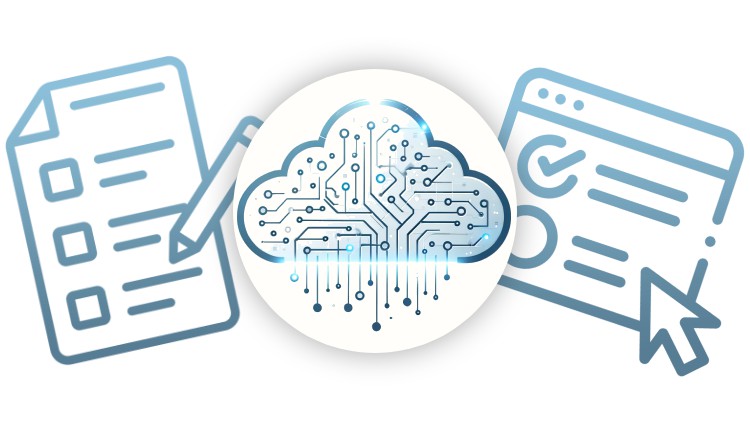
350+ Cloud Computing Interview Questions and Answers MCQ Practice Test Quiz with Detailed Explanations.
What you will learn
Comprehensive Understanding of Cloud Computing Concepts
Proficiency in Cloud Security and Compliance
Skills in Cloud Management and Operations
Awareness of Advanced Cloud Technologies and Applications
Description
350+ Cloud Computing Interview Questions and Answers MCQ Practice Test Quiz with Detailed Explanations. [Updated 2024]
Embark on a comprehensive journey to master the essentials and complexities of Cloud Computing with our specially curated MCQ practice course. Designed for beginners and professionals alike, this course offers an in-depth exploration of Cloud Computing’s core concepts, architectures, security, management, advanced technologies, and practical applications. Whether you’re preparing for certification exams, job interviews, or seeking to enhance your understanding of Cloud Computing, our course is your ideal companion.
What You’ll Learn:
- Fundamentals of Cloud Computing: Dive into the basics of Cloud Computing, understanding its definition, characteristics, and various service models like IaaS, PaaS, and SaaS. Get acquainted with different deployment models including Public, Private, and Hybrid Clouds.
- Cloud Architecture and Design: Unravel the intricacies of Cloud Architecture, including the Cloud Computing stack, virtualization techniques, multitenancy, and the concepts of scalability and elasticity in cloud environments.
- Cloud Security and Compliance: Navigate the critical aspects of Cloud Security. Learn about potential threats and risks, best practices for ensuring data protection, and the importance of compliance with regulations like GDPR and HIPAA in the Cloud.
- Cloud Management and Operations: Understand the operational aspects of Cloud Computing. Compare major Cloud Service Providers (CSPs), explore different cloud migration strategies, and learn about effective monitoring and cost optimization techniques.
- Advanced Cloud Technologies: Delve into cutting-edge cloud technologies including Containerization with Docker and Kubernetes, Serverless Computing, and Cloud-native Development. Explore the role of microservices and CI/CD in modern Cloud environments.
- Cloud Applications and Use Cases: Discover how Cloud Computing is revolutionizing various domains. Learn about enterprise applications, big data analytics, and emerging use cases in IoT and AI/ML services in the Cloud.
Course Format:
Our Cloud Computing MCQ practice course is structured to provide an interactive and engaging learning experience. The course is divided into quizzes corresponding to each of the six comprehensive sections. Each quiz contains a variety of questions designed to test and enhance your understanding of Cloud Computing concepts, from basic definitions to advanced applications.
We Update Questions Regularly:
- Stay Current: We understand that Cloud Computing is a rapidly evolving field. To ensure that our content remains relevant and up-to-date, we regularly review and update our questions.
- Latest Trends and Technologies: Our updates include the latest trends, technologies, and changes in compliance and best practices in the Cloud Computing domain.
- Continuous Learning: Regular updates mean continuous learning opportunities for you, keeping you informed about the latest developments in the field.
Frequently Asked Questions (FAQs):
- What are the key characteristics of Cloud Computing? Answer: On-demand self-service, broad network access, resource pooling, rapid elasticity, and measured service.
- What is the difference between IaaS, PaaS, and SaaS? Answer: IaaS provides infrastructure resources, PaaS offers a platform for app development, and SaaS delivers software over the internet.
- How does virtualization work in cloud computing? Answer: Virtualization allows multiple virtual machines to run on a single physical machine, sharing its resources.
- What are the primary concerns regarding cloud security? Answer: Data breaches, loss of control over data, and compliance with regulatory requirements are major concerns.
- What is a Hybrid Cloud? Answer: A Hybrid Cloud combines public and private clouds, offering a balance of control and flexibility.
- How do containers differ from virtual machines? Answer: Containers share the host system’s kernel, are more lightweight, and provide a consistent environment for applications.
- What is serverless computing? Answer: Serverless computing allows developers to build and run applications without managing servers, focusing on code execution.
- What is the role of AI and ML in Cloud Computing? Answer: AI and ML are used for data analytics, automation, improving security, and providing intelligent insights in cloud environments.
- Why is cloud migration important for businesses? Answer: Cloud migration is important for scalability, flexibility, cost-effectiveness, and enhanced collaboration.
- What are the best practices for Cloud Cost Management? Answer: Regularly monitoring usage, optimizing resource allocation, and choosing the right pricing models are key practices.
Enroll now to gain a competitive edge in the field of Cloud Computing. This course promises not just to prepare you for exams but to equip you with the knowledge and skills for a future-proof career in the Cloud. Let’s demystify the Cloud together!
Content